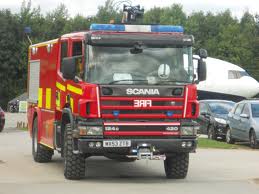
The Scottish Fire and Rescue Service in Fife has exceeded its target number of Home FireSafety Visits during the first quarter of 2014.
Fire chiefs say the initiative has contributed to a reduction in house fires encountered by the service.
Fife Councillors discussed the SFRS Fife performance report at a meeting of the council's Safer Communities Committee this week. And Committee Chair Kenny Selbie welcomed the report as 'very positive news for fire safety in Fife'
During the period 1st which shows an increase of 48%.
Local Senior Officer for Fife Iain Vincent said: "These visits have been conducted using a direct targeted approach using local knowledge and intelligence to target the higher risk areas.
"These visits have also been conducted following self-referrals and referrals from a range of partner agencies as well as being conducted following our attendance at incidents.
"We continue to closely monitor the performance of all stations to ensure that these targets are achieved and to ensure fire safety advice and smoke alarms are available to people across all our communities."
However Mr Vincent warns: "We can't be complacent. Although our figures show a decrease of 30% in accidental dwelling fires and 37% in fire casualties against the same period last year, they also show that 13 of these had no smoke alarms and 10 had non-working smoke alarms, that's over 47% of the dwelling fires we attended had no means of early warning and detection.
"We would urge every household of the need to have working smoke alarms. We provide free home fire safety visits and fit smoke alarms where required. We need you to join Scotland's fight against fire and request a visit by calling the SFRS freephone number 0800 0731 999, or by contacting their local fire station."
Fife also saw a reduction of 28% in deliberate fires over the same period last year.
Chiefs say the decrease is due to the excellent work that is done with a number of youths in our DiversiFIRE youth engagement programme which educates youths to the dangers of fire. In addition, our local fire crews also provided education to schools to highlight the dangers and consequences of deliberate fire setting.
Mr Vincent said: "We continue to develop links with social work, NHS and other key partners with the aim of identifying people considered vulnerable to the effects of fire in order to develop joint risk reduction strategies.
"We also ensure that community fire safety messages and education relating to secondary fires are delivered prior to the spring and summer holidays. During the school holidays we tend to see an increase in fires in rubbish bins, grassland and wooded areas.
"Whilst we are attending these deliberate fires, a house fire or road traffic collision could be developing and at least one of our fire engines is unavailable. This could cost precious seconds and minutes, which could put lives in our communities at risk."
Malicious false alarms also saw a 65% decrease due to our call challenge protocol as well as good working relationships with Police Scotland.
Mr Vincent says: "We react to Hoax calls so if we receive hoax calls in a specific area then we target the local schools in that area and educate them on the risks of making a hoax call."

 10°C
10°C
 10°C
10°C